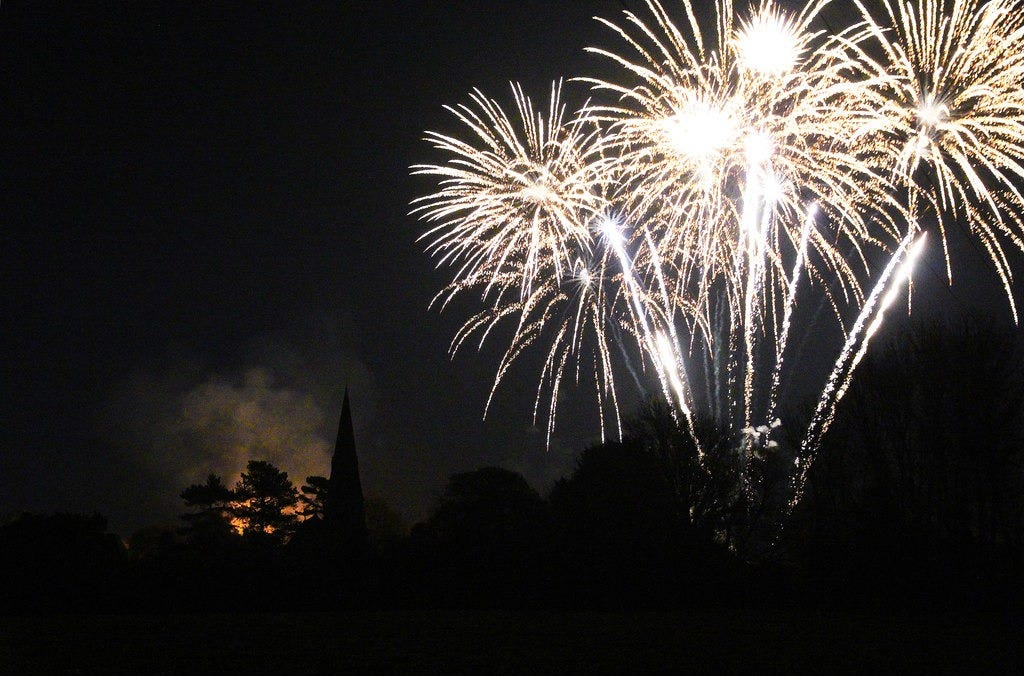Remember, Remember and Render
Pondering the transience of temporal authority on Bonfire (and Election) Night
Over a brown, weedy field, a cold autumn breeze chilling the evening, light exploded and shimmered.
It was incongruous to this American. I was used to brilliant fireworks in heavy Midwestern humidity and sweaty heat, deep green foliage shadowy and fecund in the darkness, mosquitoes buzzy and insistent. But this was November the fifth in England, near Cambridge. People were remembering some guy fellow named Guy Fawkes. This certainly wasn’t Independence Day. No, it was Bonfire Night.

Fawkes and the rest of his Gunpowder Plot gang were zealots. Devout Roman Catholics, they plotted to literally blow up the Houses of Parliament, majestically situated on the banks of the Thames, along with King James I, similarly crowned with authority. But in the wee hours of November 4, 1605, in an undercroft that had been stealthily packed with nearly forty barrels of explosives, an ominous fuse, and ready matches, Guy Fawkes was caught.
So what do patriotic English folk do to remember this thwarted act of terrorism? From a highly readable account of Bonfire Night, The Independent states thus:
The plot is commemorated every autumn with the burning of an effigy of Guy Fawkes, its mastermind, an oddly pagan act of gloating sanitised by the addition of fireworks, sparklers and toffee apples.
Heh. There’s something base and primal, yes even pagan, about such festivities. So Americans aren’t the only ones to blow up stuff to celebrate moments of national import and, honestly, to relish the downfall of enemies. Just look at our traditionally prim and buttoned-up allies across the pond, getting all gleeful and—if I may say so—slightly scary redneck! Here’s a little old rhyme for today:
“Remember, remember, the fifth of November,
“Gunpowder, treason and plot!
“We see no reason,
“Why gunpowder treason,
“Should ever be forgot!
Perhaps it’s no coincidence that our American election day this year falls on November 5. I’m hardly calling for mass explosions or violence or anything like that. In all seriousness, I pray that people maintain level heads as the evening grows old and try to remember to at least respect their neighbors. Playful celebrations about election returns are fine; destruction and bloodshed are obviously not.
Which brings me back to Bonfire Night. It’s a weird and silly holiday, to be sure. Guy Fawkes himself was tortured and hung, blessed enough in his quick death at the end of a rope to be spared the disembowelment that was planned for him. The grisly demise he and others experienced, at least to our modern eyes, were signs of their times. Treason and planned slaughter were punished with extremely public and gory deaths in the 17th century. The punishments highlighted just how seriously the powers that be considered the crimes. And the crimes were serious because of their potential import. It’s also why people found commemorating events like Bonfire Night so compelling. They’d been saved from a terrible event, not least of which the lives and structures that were spared, plus awful and unsettling national upheaval. No wonder they wanted to celebrate. It was like a collective sigh of relief, complete with a tongue-in-cheek fireworks tease at the explosives that never burst.
But the fireworks booming on this night still nod, however beautifully, to the inevitable break down all earthly rulers and realms face. King James died eventually, in 1625, not at the hands of impassioned men but due to his own sin. And every Caesar, be he—or she—great or not, ends up like Ozymandias, dust in sandy soil.
I helped our youngest daughter practice her memory work last night and tonight. This week’s Bible verse? “Therefore render to Caesar the things that are Caesar’s, and to God the things that are God’s” (Matthew 22:21). Thanks, Teacher, for that reminder. It’s like that time Jesus told his disciple Peter to pull money out of a fish’s mouth to pay taxes (Matthew 17:24-27). He’s nodding to temporal authority, but look at that! He ultimately controls the world. He’s the one who lasts.
There’s an old hymn I love, “Praise the Almighty, My Soul, Adore Him” with a verse1 that always reminds me to rightly order my trust. It goes like this:
Trust not in princes, they are but mortal; Earthborn they are and soon decay. Naught are their counsels at life's last portal, When the dark grave doth claim its prey. Since, then, no man can help afford, Trust ye in Christ, our God and Lord. Hallelujah! Hallelujah!
Yes, I voted today. But I’m also going to keep living, regardless of the outcomes.2 Tomorrow we will go to Divine Service and sing praise to our God who is forever, who always gives us reasons to rejoice.
Verse 2 from The Lutheran Hymnal #26.
And there’s a lot of outcomes to be had. Local office holders, tax considerations, a state amendment, state and federal offices. No, there’s no just one important race.

